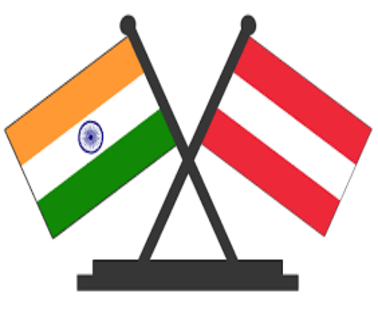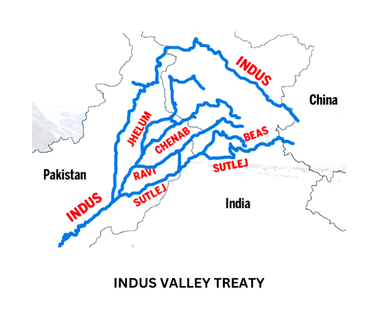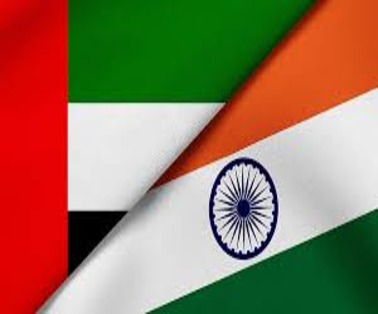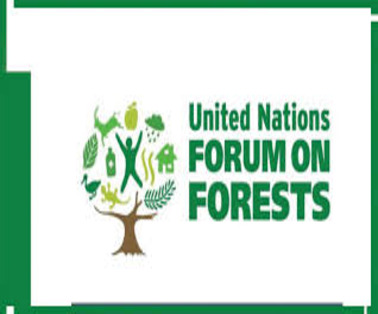India and Austria share a historically strong and evolving bilateral relationship, marked by shared democratic values, economic cooperation, and a common commitment to global peace. The year 2024 marks the 75th anniversary of diplomatic ties between India and Austria, and this was celebrated with the first visit by an Indian Prime Minister to Austria in 41 years.
Key Highlights of the 2024 India-Austria Summit
- PM Modi’s visit to Austria included high-level meetings with President Alexander Van der Bellen and Chancellor Karl Nehammer.
- Both sides expressed support for a free and open Indo-Pacific, maritime security, and compliance with international laws like UNCLOS.
- Discussions covered European and West Asian developments, including efforts to resolve the Ukraine conflict through diplomacy.
- Austria showed interest in joining the India-Middle East-Europe Economic Corridor (IMEC), reinforcing its role in global connectivity.
- The two countries agreed to deepen economic partnerships, focusing on green technologies, digital innovation, infrastructure, and smart cities.
- Austria’s Hydrogen Strategy was aligned with India’s Green Hydrogen Mission, setting the stage for strong cooperation in renewable energy.
- Commitments to climate neutrality were reaffirmed—Austria targets 2040, India aims for net zero emissions by 2070.
- Startup collaboration was boosted via initiatives like Start-Up Bridge and Austria’s Global Incubator Network.
- Austria reaffirmed support for India’s UN Security Council bid (2028-29), while India supported Austria’s bid for 2027-28.
- India invited Austria to join the International Solar Alliance (ISA) for sustainable development cooperation.
Historical Context: Austria’s Independence and India’s Support
- Following WWII, Austria was divided among Allied powers until independence was restored in 1955 via the State Treaty.
- India played a pivotal role in supporting Austria’s sovereignty, including lobbying at the United Nations General Assembly.
- PM Nehru’s 1955 visit was the first state visit to independent Austria and cemented India’s support.
Austria’s Neutral Status and Strategic Alignment
- Austria’s constitutional neutrality prohibits military alliances or foreign bases but has evolved post-Cold War.
- Since joining the EU in 1995, Austria has cooperated more with Western-led initiatives, including NATO’s Partnership for Peace.
- Austria’s amended neutrality law (2010) allows participation in EU-led military operations.
Political and Economic Relations
- Formal India-Austria diplomatic ties were established in 1949.
- The Indo-Austrian Joint Economic Commission (JEC) promotes cooperation across sectors like steel, transport, and metallurgy.
- Bilateral trade stood at USD 2.84 billion in 2022, growing by 14.97% over the previous year.
- India’s exports: electronics, apparel, textiles, vehicles.
- Austria’s exports: machinery, railway equipment, steel, and chemicals.
Institutional and Strategic Mechanisms
- Dialogue platforms include Foreign Office Consultations (FOC) and the JEC, covering migration, trade, skill development, and cultural ties.
- In 2013, India launched Austria’s first two satellites (TUGSAT-1 and UniBRITE) from Sriharikota via PSLV-C20, showcasing space cooperation.
Indian Diaspora in Austria
- Over 31,000 Indians reside in Austria, including healthcare professionals, entrepreneurs, and UN employees.
- More than 500 Indian students are currently pursuing higher education in Austria.
Cultural Connections
- Indo-Austrian cultural links date back to 16th century explorer Balthasar Springer.
- Sanskrit has been taught in Austria since 1845, with the University of Vienna hosting the Institute for South Asian, Tibetan and Buddhist Studies.
- Nobel Laureate Rabindranath Tagore visited Austria twice, strengthening intellectual ties.
- A 2011 MoU established an Indian Studies Chair at University of Vienna, supported by ICCR.
Austria’s Strengths: Infrastructure and Sustainability
Transport
- Austria’s high-speed autobahns and rail systems are among the most efficient in Europe.
- Public transport in Austrian cities is modern, eco-friendly, and widely used.
Renewable Energy
- Austria leads in hydropower, solar, wind, and biomass energy.
- The country aims to achieve climate neutrality by 2040 and offers green tech expertise beneficial to India.
Waste and Water Management
- Austria boasts one of the highest recycling rates globally.
- Water supply and sanitation systems are modern, sustainable, and highly regulated.
Research and Innovation
- Austria invests heavily in R&D, targeting smart city solutions, energy-efficient buildings, and infrastructure innovation.
- It plans to raise R&D spending to over 3.7% of GDP.
Significance of India-Austria Relations
- Shared values of democracy, multilateralism, and sustainable development.
- Austria’s expertise in Green Hydrogen aligns with India’s energy transition goals.
- Austria acts as a gateway to Central and Eastern Europe for India.
- Both countries have taken balanced diplomatic approaches to global conflicts like the Russia-Ukraine war.
Challenges in India-Austria Relations
- Geographical distance limits the frequency of official engagements.
- Trade imbalance: India imports more high-value products than it exports.
- Structural economic differences limit trade depth.
- Visa delays affect mobility for professionals, students, and tourists.
About Austria
- Austria is located in Southern Central Europe, sharing borders with 8 countries, including Germany, Italy, and Switzerland.
- It is a landlocked, mountainous country known for the Alps.
- Capital: Vienna
- Member of EU, OECD, WTO, IMF, and WHO.
- Known for political neutrality, cultural heritage, and environmental leadership.
To Download Monthly Current Affairs PDF Click here
Click here to get a free demo
Discover all about CLAT Exam



